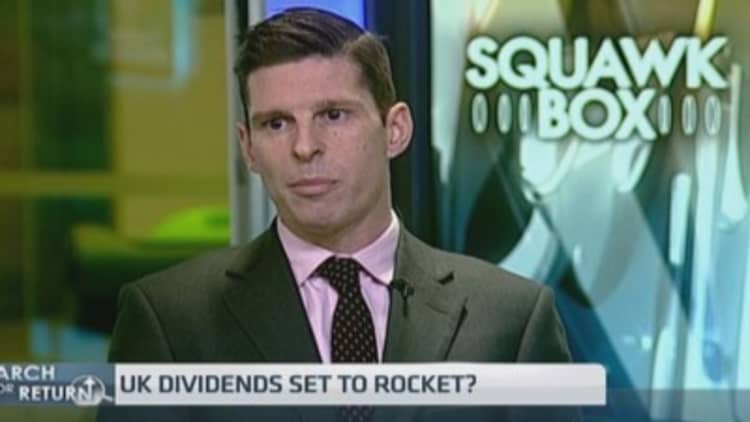
Britain's top companies are set to give back £85.3 billion ($130.1 billion) to shareholders for 2014—nearly 11 percent more than the year before, market data firm Markit predicted Monday. But the market data firm warned that payouts from some oil giants could be jeopardized in the coming years.
"The thing to be aware of, with this, is the risk—the concentration risk and dependence on a handful of big players, two of which are Royal Dutch Shell and BP, and the concerns around sustained low oil price," Ryan Bransfield, head of dividend research at Markit, told CNBC on Monday.
"The risk is that given that these companies in the oil and gas sector account for 15 percent of the total payout, if the oil price remains low for a sustained period, this could become a risk and investors could find themselves skating on thin ice next (fiscal) year."
Shares of both BP and Royal Dutch Shell are listed on the FTSE 100 index of biggest U.K. companies. The former is seen returning £4.56 billion ($6.95 billion) for 2014, while BP is seen paying £4.44 billion.
Read MoreCould 2015 herald a 'new oil order'?
Bransfield forecast the companies' dividends would remain as forecast for 2014—with 2015 being riskier.
"Our expectation is no change to payment (for 2014). They (the companies) have been emphatic; they have emphasized their commitment to the dividend. They have been very focused on reining in spending and asset disposal and propping up the balance sheet," he told CNBC.
Brent crude oil prices have fallen by around half since the middle of last year, due in part to oversupply. On Monday it fell to $52.90, a five and a half year low.
Read MoreTrack Brent crude prices with CNBC
Apart from the oil slump, BP continues to face problems related to compensation claims from the Gulf of Mexico spill and from its holdings in Russian firm Rosneft.
"At current levels the dividends (of BP and Shell) are not covered by free cash flow, meaning payouts need to be funded from debt," said Bransfield and colleague Kevin Soyer in a Markit report.
"We believe that BP and Shell should be able to sustain payments in the near-term but reduced revenues have lowered our expectations for growth. If the oil price remains below $80 per barrel for more than one year, then CapEx (capital expenditure) budgets across the sector would need to be cut very aggressively in order to protect dividends."




